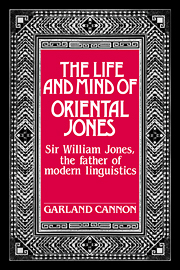Book contents
- Frontmatter
- Contents
- Preface
- Introduction
- Chronology of Jones's Life
- 1 A Barbaric Oriental Conqueror (to 1770)
- 2 Delicate Arab Maidens and Liquid Ruby (1770–1772)
- 3 Persian Jones and Constitutional Law (1772–1777)
- 4 The Athenian and Eleutherion (1778–1780)
- 5 An Ass Laden with Gold (1780)
- 6 Politics: Writings and Activism (1780–1782)
- 7 James River Property (1782–1783)
- 8 A Vision in the Indian Ocean (1783–1785)
- 9 A Sacred Oriental Language (1785)
- 10 A Genetic Explanation: Indo-European (1786–1787)
- 11 Sanskrit Literary Treasures (1787–1788)
- 12 An Indian Renaissance (1789)
- 13 A Burning Tropical Sun (1790–1791)
- 14 Scholar-Martyr (1791–1794)
- 15 Jones Today
- Appendix Five New Letters by Jones
- Notes
- Selected Bibliography
- Index
3 - Persian Jones and Constitutional Law (1772–1777)
Published online by Cambridge University Press: 11 September 2009
- Frontmatter
- Contents
- Preface
- Introduction
- Chronology of Jones's Life
- 1 A Barbaric Oriental Conqueror (to 1770)
- 2 Delicate Arab Maidens and Liquid Ruby (1770–1772)
- 3 Persian Jones and Constitutional Law (1772–1777)
- 4 The Athenian and Eleutherion (1778–1780)
- 5 An Ass Laden with Gold (1780)
- 6 Politics: Writings and Activism (1780–1782)
- 7 James River Property (1782–1783)
- 8 A Vision in the Indian Ocean (1783–1785)
- 9 A Sacred Oriental Language (1785)
- 10 A Genetic Explanation: Indo-European (1786–1787)
- 11 Sanskrit Literary Treasures (1787–1788)
- 12 An Indian Renaissance (1789)
- 13 A Burning Tropical Sun (1790–1791)
- 14 Scholar-Martyr (1791–1794)
- 15 Jones Today
- Appendix Five New Letters by Jones
- Notes
- Selected Bibliography
- Index
Summary
Jones's origin placed him outside the social categories in an age of sharp distinctions, although men of letters occasionally moved between classes. He employed a small inheritance, a good education, “precocious intellectual gifts, intense and unusual intellectual interests and a pleasant personality” to earn an initial place befitting his talents and ambition. As the tutorship had not really provided an independent livelihood, he had chosen the route that others like him sometimes took, and law gratified both his higher ambition and his love of scholarship, especially comparative study.
Once Poems appeared, he sent all his books unrelated to law or science to Oxford, “where they shall be till I resume my former pursuits in my old age. You will see my shelves filled with reports and abridgements. Tully and Demosthenes alone have preserved their places, and I read no other books in the ancient languages. These I devour – these I get by heart” (1:124). Thus he sought to implement his promise to abandon Orientalism, even as he thought tantalizingly of his long-finished Commentariorum. He read Cicero's works annually “to pervade and fathom the soul of a man, like himself: accomplished in every great attainment of the human genius, and applying them to the interests of active life. The close study of the Greek orators was to him a part of a course of the philosophy of law and legislation.”
- Type
- Chapter
- Information
- The Life and Mind of Oriental JonesSir William Jones, the Father of Modern Linguistics, pp. 53 - 83Publisher: Cambridge University PressPrint publication year: 1991



